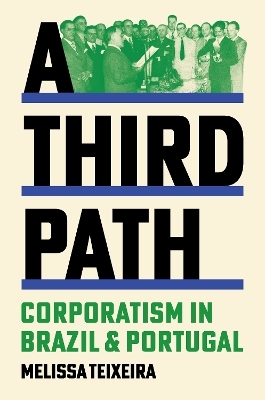
A Third Path
Corporatism in Brazil and Portugal
Seiten
2024
Princeton University Press (Verlag)
978-0-691-19102-7 (ISBN)
Princeton University Press (Verlag)
978-0-691-19102-7 (ISBN)
How Brazil and Portugal experimented with corporatism as a “third path” between laissez-faire capitalism and communism
Following the Great Depression, as the world searched for new economic models, Brazil and Portugal experimented with corporatism as a “third path” between laissez-faire capitalism and communism. In a corporatist society, the government vertically integrates economic and social groups into the state so that it can manage labor and economic production. In the 1930s, the dictatorships of Getúlio Vargas in Brazil and António de Oliveira Salazar in the Portuguese Empire seized upon corporatist ideas to jump-start state-led economic development. In A Third Path, Melissa Teixeira examines these pivotal but still understudied initiatives.
What distinguished Portuguese and Brazilian corporatism from other countries’ experiments with the mixed economy was how Vargas and Salazar dismantled liberal democratic institutions, celebrating their efforts to limit individual freedoms and property in pursuit of economic recovery and social peace. By tracing the movement of people and ideas across the South Atlantic, Teixeira vividly shows how two countries not often studied for their economic creativity became major centers for policy experimentation. Portuguese and Brazilian officials created laws and agencies to control pricing and production, which in turn generated new social frictions and economic problems, as individuals and firms tried to evade the rules. And yet, Teixeira argues, despite the failings and frustrations of Brazil’s and Portugal’s corporatist experiments, the ideas and institutions tested in the 1930s and 1940s constituted a new legal and technical tool kit for the rise of economic planning, shaping how governments regulate labor and market relations to the present day.
Following the Great Depression, as the world searched for new economic models, Brazil and Portugal experimented with corporatism as a “third path” between laissez-faire capitalism and communism. In a corporatist society, the government vertically integrates economic and social groups into the state so that it can manage labor and economic production. In the 1930s, the dictatorships of Getúlio Vargas in Brazil and António de Oliveira Salazar in the Portuguese Empire seized upon corporatist ideas to jump-start state-led economic development. In A Third Path, Melissa Teixeira examines these pivotal but still understudied initiatives.
What distinguished Portuguese and Brazilian corporatism from other countries’ experiments with the mixed economy was how Vargas and Salazar dismantled liberal democratic institutions, celebrating their efforts to limit individual freedoms and property in pursuit of economic recovery and social peace. By tracing the movement of people and ideas across the South Atlantic, Teixeira vividly shows how two countries not often studied for their economic creativity became major centers for policy experimentation. Portuguese and Brazilian officials created laws and agencies to control pricing and production, which in turn generated new social frictions and economic problems, as individuals and firms tried to evade the rules. And yet, Teixeira argues, despite the failings and frustrations of Brazil’s and Portugal’s corporatist experiments, the ideas and institutions tested in the 1930s and 1940s constituted a new legal and technical tool kit for the rise of economic planning, shaping how governments regulate labor and market relations to the present day.
Melissa Teixeira is assistant professor of history at the University of Pennsylvania.
| Erscheinungsdatum | 28.02.2024 |
|---|---|
| Zusatzinfo | 25 b/w illus. 2 maps. |
| Verlagsort | New Jersey |
| Sprache | englisch |
| Maße | 156 x 235 mm |
| Themenwelt | Geschichte ► Allgemeine Geschichte ► Neuzeit (bis 1918) |
| Geschichte ► Teilgebiete der Geschichte ► Wirtschaftsgeschichte | |
| Wirtschaft ► Volkswirtschaftslehre | |
| ISBN-10 | 0-691-19102-6 / 0691191026 |
| ISBN-13 | 978-0-691-19102-7 / 9780691191027 |
| Zustand | Neuware |
| Informationen gemäß Produktsicherheitsverordnung (GPSR) | |
| Haben Sie eine Frage zum Produkt? |
Mehr entdecken
aus dem Bereich
aus dem Bereich
Giordano Bruno - ein ketzerisches Leben
Buch | Hardcover (2024)
C.H.Beck (Verlag)
CHF 41,85
das dramatische 16. Jahrhundert
Buch | Hardcover (2024)
Rowohlt Berlin (Verlag)
CHF 47,60
Kunst und Gesellschaft an der Schwelle zur globalen Welt
Buch | Hardcover (2024)
Klett-Cotta (Verlag)
CHF 56,90


